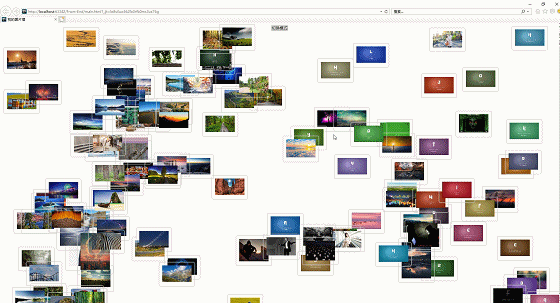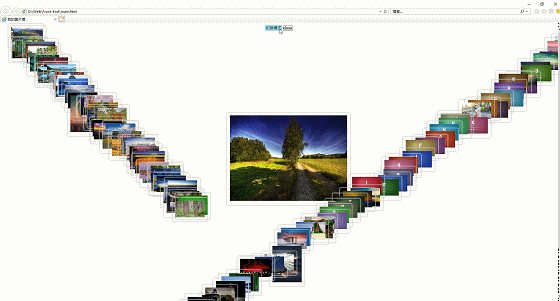基于Web的浮动图片墙
个人博客:http://www.chenjianqu.com/
原文链接:http://www.chenjianqu.com/show-33.html
直接上效果图:
Html设计
我的图片墙
CSS设计
*{//通过通配符 去掉所有元素的边框
margin:0;
padding: 0;
}
#main{
position:absolute;
top:0;
}
.bar{
margin: 0 auto;
text-align: center;
}
#menu{
positon:fixed;
z-index:999;
top:0;
}
.close{
positon:absolute;
right: 0;
top:0
}
.box{
padding:5px 5px 5px 5px;//顶部 右边 下边 左边的边距
}
.pic{
padding:10px;
border:1px solid #ccc;
border-radius: 5px;
box-shadow: 0 0 5px #ccc;
}
.pic image{
width:100px;
height: auto;
}JS
从上面的HTML和CSS可以知道,此时的页面中还没有放入图片,所以JS的代码的第一部分是加入往网页中写入图片:
//添加图片
function AddPic() {
var addStr="";
for(var i=1;i<=120;i++)
{
addStr+='\n' +
'\n' +
' \n' +
'\n' +
'\n'
}
$("#pidAddTag").after(addStr);
}
\n' +
'\n' +
'\n'
}
$("#pidAddTag").after(addStr);
}然后要实现瀑布流界面:
实现瀑布流的思路很简单,首先要设置所有图片的宽度一致,然后首先排列好第一列。在第一列的基础上,按照最小宽度的原则,依次插入图片,最后就可以得到如上图所示的瀑布流效果了。代码实现如下:
//以瀑布流的方式排布图片
function waterfall() {
clearInterval(tick);
StopAllPicAnimate();
currentPoint=1;
var w=100;
var hArr=[];
$(".box").css({
"position":"absolute",
// "float":"left",
});
$(".pic").css({
"width":"auto",
"height":"auto",
});
$(".pic").children().css({
"width":w,
"height":"auto",
});
var $boxs=$("#main").children();
var cols=Math.floor($(window).width()/(w+20));//得到列数
$('#main').width((w+20)*cols).css('margin','0 auto');//设置main div的宽度 同时让它居中
picObjArr.each(function (index,value) {//遍历boxs,两个参数:元素索引和值
var h = $boxs.eq(index).outerHeight();//包括padding的高度
if (index < cols) {
$(value).css({
"position":"absolute",
"top":50,
"left":index*(w+20)
});
hArr[index] = h+50;
wallfallPosArr[index] = {left: index*(w+20), top: 50};
}
});
picObjArr.each(function (index,value) {
if(index>=cols) {
var h = $boxs.eq(index).outerHeight();
var minH = Math.min.apply(null, hArr);//找到hArr中的最小值
var minH_Index = $.inArray(minH, hArr);//找到minH在数组中的索引
$(value).css({
"position": "absolute",
"top": minH,
"left": minH_Index * (w + 20)
});
wallfallPosArr[index] = {left: minH_Index * (w+20), top: minH};
hArr[minH_Index] += $boxs.eq(index).outerHeight();//更新高度数组里面的值
}
});
}接下来实现Y型排列:
这个实现还是很简单的,遍历每一张图片,然后递增设置Margin就可以了。代码如下:
function centerMode()
{
//初始化属性
$(".box").css({
"position":"absolute",
"float":null,
});
$(".pic").children().css({
"width":100,
"height":"auto",
});
//设置中心图片的位置
var len=picObjArr.length;
picObjArr.each(function (index,value) {//获得所有图片的位置
posArray[index].width=$(this).children().outerWidth();
posArray[index].height=$(this).children().outerHeight();
if(index然后是实现心形排列:
心形曲线的极坐标方程请自行百度,下面直接给出代码。
function ShowWXY() {
StopAllPicAnimate();//清除动画队列
//初始化属性
$(".box").css({
"position":"absolute",
"float":null,
});
$(".pic").children().css({
"width":100,
"height":"auto",
});
currentPoint=-1;
//设置中心图片的位置
var len=picObjArr.length;
picObjArr.each(function (index,value) {//获得所有图片的位置
posArray[index].width = $(this).children().outerWidth();
posArray[index].height = $(this).children().outerHeight();
if (index < len / 2) {
posArray[index].left = index * 10;
posArray[index].top = index * 10;
} else {
posArray[index].left = $(window).width() - (index - len / 2) * 25;
posArray[index].top = (index - len / 2) * 18;
}
});
var dx=10,dy=10;
var r=200;
var last_t=-1;
var m, n, x, y, i,t;
for (i = 0; i <= 200; i += 0.04) {
m = i;
n=-r*(((Math.sin(i)*Math.sqrt(Math.abs(Math.cos(i))))/(Math.sin(i)+1.4))-2*Math.sin(i)+2);
x = n * Math.cos(m) + $(window).width()/2;
y = n * Math.sin(m) + 200;
t=Math.floor(i%posArray.length);
if(t!=last_t) {
//console.log(t);
posArray[t].left = x;
posArray[t].top = y;
}
last_t=t;
}
}加下来是编写浮动的代码。若想要图片产生浮动的效果,只需要设置一个定时器,每隔一段时间图片x和y方向上偏移一段距离即可。
首先对每个图片的x和y方向设置一个偏移量随机数。
//初始化图片位置数组
for(var i=0;i然后设置定时器事件,并限制图片浮动的范围。
//设置图片游动定时器
tick=setInterval(PicFloat, 500);
function PicFloat() {
var cl=centerPicPos.left,ct=centerPicPos.top,cw=centerPicPos.w,ch=centerPicPos.h;
var cr=cl+cw,cb=ct+ch;
//限制图片的游走区域
for(var i=0;i$(window).width())
posArray[i].randomLeft=-Math.abs(posArray[i].randomLeft);
if(pt<0)
posArray[i].randomTop=Math.abs(posArray[i].randomTop);
else if(pb>aeraHeight )
posArray[i].randomTop=-Math.abs(posArray[i].randomTop);
//图片不能盖住中心图片
if(pb>ct && ptcl &&plct && ptcr))
posArray[i].randomLeft = -posArray[i].randomLeft;
if(pb>ct && ptcl))
posArray[i].randomTop = -posArray[i].randomTop;
if(pb>cb && ptcl))
posArray[i].randomTop = -posArray[i].randomTop;
if(pbct &&pl>cl &&pr 最后就是编写图片的打开和关闭。
这部分的代码原理上很简单的,但是由于是要考虑各种情况,所以反而是编写最麻烦的一段。
//点击关闭按钮
$closeBtn.click(function () {
isShowFullPic=false;
if(mode==1) {
centerPicObj.css({
"left": wallfallPosArr[currentPoint].left,
"top": wallfallPosArr[currentPoint].top,
"z-index":1,
});
centerPicObj.children().children().css({
"width": 100,
"height": "auto",
});
}
else if(mode==2) {
centerPicObj.css({
"left": posArray[currentPoint].left,
"top": posArray[currentPoint].top,
"z-index":1,
});
centerPicObj.children().children().css({
"width": 100,
"height": "auto",
});
}
else if(mode==3) {
if(currentPoint==-1)
currentPoint=1;
centerPicObj.css({
"left": posArray[currentPoint].left,
"top": posArray[currentPoint].top,
"z-index":1,
});
centerPicObj.children().children().css({
"width": 100,
"height": "auto",
});
}
centerPicPos.w=0
centerPicPos.h=0;
centerPicPos.left=0;
centerPicPos.top=0;
$closeBtn.hide();
});//设置图片的点击事件
picObjArr.each(function (index,value) {
$(this).click(function () {
StopAllPicAnimate();//清除动画队列
isShowFullPic=true;
$closeBtn.show();
//重置中心图片的大小和位置
if(mode==1) {
centerPicObj.css({
"left": wallfallPosArr[currentPoint].left,
"top": wallfallPosArr[currentPoint].top,
"z-index":1,
});
centerPicObj.children().children().css({
"width": 100,
"height": "auto",
});
}
else if(mode==2)
{
clearInterval(tick);
centerPicObj.css({
"left": posArray[currentPoint].left,
"top": posArray[currentPoint].top,
"z-index":1,
});
centerPicObj.children().children().css({
"width": 100,
"height": "auto",
});
}
else if(mode==3)
{
if(currentPoint==-1)
currentPoint=1;
clearInterval(tick);
centerPicObj.css({
"left": posArray[currentPoint].left,
"top": posArray[currentPoint].top,
"z-index":1,
});
centerPicObj.children().children().css({
"width": 100,
"height": "auto",
});
count++;
if(count==4)say();
}
ResetSomePic();
currentPoint=index;
centerPicObj=$(this);
centerPicObjPos={"left":$(this).left}
centerPicPos.w=800;
centerPicPos.h=$(this).height()/$(this).width()*800;
centerPicPos.left=$(window).width()/2-centerPicPos.w/2;
centerPicPos.top=300;
$(this).css({
"left":centerPicPos.left,
"top":centerPicPos.top,
"z-index":10.
});
$(this).children().css({
"width":"auto",
});
$(this).children().children().css({
"width":centerPicPos.w,
"height":centerPicPos.h,
});
if(mode==2||mode==3)
{
tick=setInterval(PicFloat, 100);
}
});
})完整的项目代码请看我的github: https://github.com/chenjianqu/FloatingPictureWall




